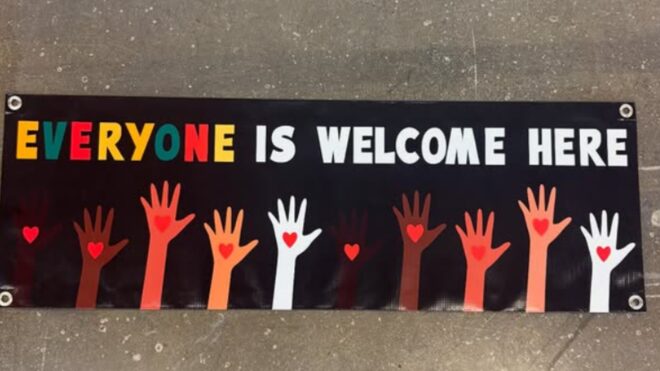When Shelby Barone walked into son Andrew's class at school on Valentine's Day, she found the kids decorating cookies. All the kids, that is, except Andrew. Her son was in the corner, head down on his desk, looking miserable. The reason? Andrew suffers from a severe peanut allergy. His school, in an effort to protect him from exposure to peanuts in other kids' lunches, took an approach that's becoming increasingly common: they segregated Andrew at his own "peanut-free" table at lunch and banned him from school events and activities involving food.
In short, Andrew was an outcast in his own school.
Shelby, whose son nearly died from his first allergic reaction to peanuts at age 2, says she understand why the school took peanut allergies seriously. But to sideline her son from socializing with his friends over lunch or at a school party? To her, that seemed too harsh. "It affected him. He felt different because of his allergies," recalls the mom from Aliso Viejo, California. "No child should ever be segregated for any reason."
And yet, as the number of children with food allergies rises (an estimated 1 in 13 kids under age 18 now have some sort of food allergy), an increasing number of schools are opting to do just that — separate the kids with food allergies from their peers.
"It's becoming more common," says Michael Spigler, vice president of education at the food allergy advocacy organization FARE. While no statistics exist on the number of schools with segregation policies in place for allergies, "Initially parents were excited to have some kind of accommodation," Spigler continues. "But now it's clear that this seclusion can lead to stigma."
More From The Stir: Checklist for Food Allergies in School: 7 Ways Parents Can Prepare Ahead
Nonetheless, schools may feel forced to take this extreme stance to keep kids with allergies safe — and to avoid lawsuits.
"As a lawyer, I would caution schools that if a child had a dangerous food allergy and the school did not take reasonable efforts to protect him, that school could be sued," says Scot Conway, JD, a licensed California attorney with 25 years experience working with children with food allergies and their parents. "Letting children with allergies sit with other kids might make allergic items too accessible."
Indeed, some schools have seen tragedy. In 2012, a 7-year-old girl in Virginia with severe peanut allergies died of an allergic reaction at her school, which did not have her medication handy. In 2013, a high school student nearly suffocated when a classmate secretly slipped a hazelnut in her drink. As these stories make clear, schools do need to take food allergies seriously, and some administrators may see sequestering these kids as a fairly fail-proof solution.
But what about the effect on the kids?
Although Shelby had been aware of her school's policy since Andrew started kindergarten, at first it didn't bother him — so it didn't bother her. By second grade, however, being shunted from his friends at lunch started to wear on him. "He felt a distinct difference between him and his friends," Shelby says. "While all of his friends would go and sit together, Andrew had to sit by himself with children he didn't relate with."
When she shared her concerns with the school, Shelby says they refused to change their policy. "They said that they could not ask parents to not send nuts in their kids lunchboxes," she recalls. "They also said that Andrew would just need to stay home on school party days."
The school claimed this was for her son's own good, but not all experts agree.
"As a certified school psychologist, I am highly concerned about isolating children for any reason, including food allergies," says Lindsay Popilskis, PhD, a school psychologist in New York. "Not only will isolating children from their classmates limit their socialization opportunities, they may experience peer rejection by being left out of birthday parties and other after-school opportunities. Children who are shunned often develop self-esteem issues, declines in their academic performance, and other problems."
They may even run the risk of being bullied. Schools and parents have reported a rise in cases where kids threaten peers with food allergies, wielding peanuts or other allergens as weapons. And sometimes even parents butt in, like picketing in front of a school in Florida to protest how their kids were forced to wash their hands and rinse their mouths to avoid exposing a 6-year-old classmate to any trace of peanuts.
While it's understandable that parents may be angry that they can't bring in cupcakes or pack their kids a PB&J for lunch at school, allergy advocates urge people to think about it from the point of view of kids like Andrew: doesn't he have a right to sit with his friends at lunch or celebrate at class parties rather than sit in a corner? Can't we as a community put up with a small inconvenience so that every kid can have the same chance to thrive at school?
More from The Stir: 10-Year-Old's Severe Peanut Allergy Cured With Miracle Transplant
For Andrew at least, being labeled an outsider was too much and eventually prompted Shelby to enroll him in a new school with a more lenient allergy policy. Her son's self-confidence soon returned.
But moving schools isn't a parent's only resort: if your school's food allergy policies seem too strict, too lax, or just not right for your child, there are things you can do. Spigler suggests that parents consider getting a personalized food allergy management plan. Section 504 of the American Disabilities Act gives kids with food allergies the right to a safe and inclusive education. It allows you to create, in collaboration with your school, a written plan describing how your school will address the individual needs of your child.
"For instance, schools may establish 'food free celebrations' so kids with allergies can participate, or hold celebrations in the cafeteria, which is safer than a classroom since there are protocols for washing down tables," says Spiger. Other experts agree that there are plenty of ways to protect kids with allergies without isolating them.
"Schools could let these kids choose two peers per day to join him under the condition that neither child brought or purchased foods that might trigger a reaction," suggests Popilskis. "Also, rather than ostracize the allergic child, turn the tables — no pun intended — and have a special spot for all the children who bring predetermined 'safe' lunches. This idea no longer labels kids with allergies in a negative light."
How do you feel about schools segregating kids with food allergies? What would you like done if it's your child?
Image via Shelby Barone




